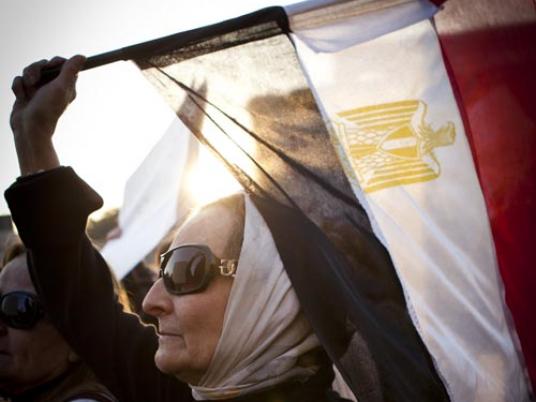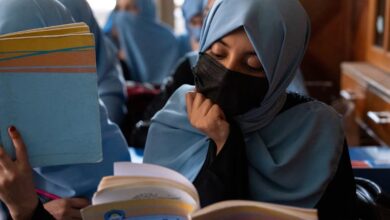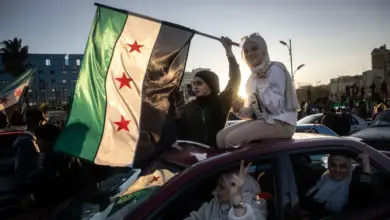
The latest draft of the constitution includes a clause that would limit the rights held by women to those compatible with the “rules” of Islamic jurisprudence. Every other aspect of the draft constitution is constrained merely by the “principles” of Islamic jurisprudence, a less demanding formulation.
The previous constitution, ratified in 1971, contained a clause that also constrained women’s rights according to the rules of Islamic jurisprudence, but activists and lawyers fear that in the context of the growing political influence of strains of conservative Islam, the wording paves the way for fresh attacks on women’s rights.
Article 36 of the proposed draft constitution reads as follows:
“The state is committed to taking all constitutional and executive measures to ensure equality of women with men in all walks of political, cultural, economic and social life, without violation of the rules of Islamic jurisprudence. The state will provide all necessary services for mothers and children for free, and will ensure the protection of women, along with social, economic and medical care and the right to inheritance, and will ensure a balance between the woman’s family responsibilities and work in society.”
Article 11 of the 1971 Constitution stated:
“The state shall guarantee harmonization between the duties of woman toward the family and her work in society, ensuring her equal status with man in fields of political, social, cultural and economic life, without violation of the rules of Islamic jurisprudence.”
Constituent Assembly in question
There have been several calls for non-Islamist political forces to boycott the Constituent Assembly, which prepared the current draft, because of Islamists’ dominance within that body.
Rights activist Manal al-Tiby withdrew from the assembly last Monday, citing monopolization by Islamists, when an article that had set a minimum age for women to get married and criminalized trafficking of female minors was canceled.
Only seven women were chosen to take part in the 100-member Constituent Assembly.
Earlier this month, several liberal and leftist parties, and many independent figures, circulated a petition against Article 36.
In the petition, the signatories claimed there was inconsistency between using the term “rules of Islamic jurisprudence” in Article 36 and the term “principles of Islamic jurisprudence” in Article 2 of the same text. This, they argued, “can conflict with religious authorities and diverse interpretations by jurisprudential schools regarding Islamic principles or provisions.”
The signatories also stressed that the article is vague and consequently incompatible with the 25 January revolution’s ideals and “Egypt’s international obligations, covenants and commitments.”
They also claimed that an illegitimate Islamist monopolization of the Constituent Assembly endangers the rights of women. The signatories called for casting a constitutional referendum on a section-by-section basis, rather than a holistic yes-or-no vote. It also demanded that approval rates for amendments to pass should be at least 75 percent, and that a period longer than 15 days should be allowed for public debate.
Madiha Doss, a professor at Cairo University, agrees.
“I, as well as many of the liberal parties, believe that groups of articles should be voted on at separate times. This is because one may be for some articles, but against others,” she says.
The president and the protesters
About 200 protesters rallied outside the Shura Council Tuesday evening to express their opposition to the domination of Islamists within the Constituent Assembly, and their discontent with many articles, including Article 36.
At the end of last month, during a visit to the US, President Mohamed Morsy said in a speech in front of the United Nations General Assembly in New York City that “he does not have the right to intervene in the work of Egypt’s Constituent Assembly.”
Nevine Ebeid, a member of the Social Democratic Party and the New Women Foundation, says Morsy’s UN speech shows he is no different from former President Hosni Mubarak. “For now, these are just words. We need to see if he will put them into actions,” she says.
Nehad Aboul Komsan, head of the Egyptian Center for Women’s Rights, says that although it is positive that he felt pressured to protect women’s rights, “he did not specify what these rights are."
“As we saw in Morsy’s presidential campaign, not many women were part of his party, and very few women are represented in his government, or presidential advisory committee,” she adds.
Vivian Fouad, activist and researcher as well as chancellor in the National Population Council, agrees with Morsy’s speech being unsatisfactory. “Women cannot depend on a president to protect their rights. It should be established in a constitution,” she says.
Critiquing Article 36
Tahani al-Gebali, judge and vice president of the Supreme Constitutional Court, agrees with Ebeid and Aboul Komsan.
“Although this article has existed relatively unmodified since former President Anwar Sadat’s 1971 Constitution, the recent Islamist takeover — especially in the constitutional committee — has renewed fears because they are not likely to favor women’s rights,” she says.
Aboul Komsan points out that the Constituent Assembly and the government agreed to remove three-quarters of Sharia by making the constitution based on principles, as with Article 2. “Why, then, do we maintain this specific article, Article 36, as pertaining to the rules of Sharia law?” she asks.
Ebeid also questions who establishes and interprets Sharia. “If Al-Azhar decides, what if the Muslim Brotherhood or Salafis disagree?” she says.
Another critique of Article 36 is its vagueness and exclusion of other rights, in education, the workforce and the family. “As long as the law does not provide for the services that allow a woman to be economically independent,” Aboul Komsan says, “she will not be able, in practice, to have all those rights the constitution claims she has.”
Article 36 also states that maternal and childcare services are to be provided to allow women to fulfill their home duties. “Does that mean that she must fulfill all her home duties in order to achieve these services? Is it a condition?” Aboul Komsan asks. “A woman’s role cannot be limited solely to reproductive rights.”
Others claim that the article also fails to ensure that women also have equal opportunities. “Equal rights are insufficient if one does not have the capacities or opportunities to gain these rights,” says Fouad. “It is difficult, for example, for a woman to gain a high-ranking position if she is subjected to domestic violence, or if she is economically dependent on her husband.”
Fouad points out that in families, women and men should have shared responsibility, and that men should likewise be able to help with home duties “without burden.”
Moreover, many women’s rights groups have blamed the state for not raising awareness on the issue. Marie Assaad, an activist, says that many women are illiterate and are not able to agree or disagree with Article 36. Like other activists, she thinks Article 36 should also criminalize discrimination against women.
“Creating a law without the institutional capacity to ensure it is practiced is problematic,” she adds. “Cultural traditions are also against women.”
Ebeid asserts that, overall, many groups — including some liberals — have sold out on the rights of women, while aiming to bargain with Islamists.
Assaad echoes this sentiment.
“The role of women needs to be equal to men, even within parties, the constitutional committee and all fields. The attitude of many liberals cannot be that focusing on women’s rights is not a current necessity,” she says.
Furthermore, the issue is even more pronounced when class is considered, Ebeid says.
“In the end, everyone is suffering, especially the poor, but the poor rural woman suffers the most,” she says.
This piece was originally published in Egypt Independent's weekly print edition.




